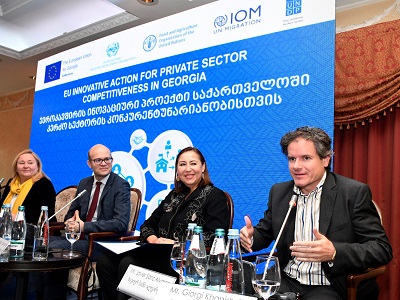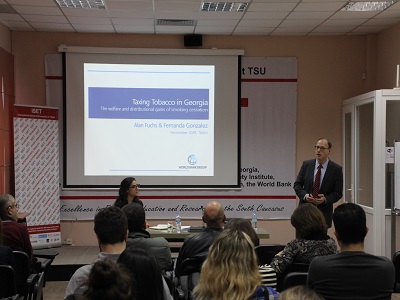- Details
On November 20, the study “Mapping of Emerging and Potential Clusters in Georgia” carried out by the ISET Policy Institute in cooperation with local and international partners was presented at the stakeholder forum ‘Promoting strong and competitive business in Georgia’ organized by the EU and the four UN agencies – UNDP, FAO, UNIDO and IOM, under their joint effort for strong and competitive private sector in Georgia. Over 100 representatives of private companies, business associations and international organizations took part in the forum to discuss business development trends in Georgia, as well as the competitive potential of the private sector on national and EU markets. The forum was attended by officials from the Ministry of Environmental Protection and Agriculture, the Ministry of Economy and Sustainable Development, the Ministry of Foreign Affairs and the Parliamentary Committee on Diaspora and Caucasus Issues.
The study has been commissioned by the United Nations Industrial Development Organization (UNIDO). UNIDO is the specialized agency of the United Nations that promotes industrial development for poverty reduction, inclusive globalization and environmental sustainability. Under the overall guidance of the UNIDO Senior Industrial Development Officer ISET in partnership with two other organizations, TBSC and ABSO, has performed mapping of emerging and potential clusters in Georgia with a focus on manufacturing and agribusiness sectors.
- Details
On November 19, ISET was visited by Mr. Alan Fuchs of the World Bank Group, whose presentation, 'Taxing Tobacco in Georgia: The welfare and distributional gains of quitting smoking’, delved into the welfare and distributional impact of increasing taxes on tobacco in Georgia.
A large portion of Georgia’s population smoke, despite its long-proven negative health effects; approximately eight million deaths per year are attributed to tobacco consumption. As Mr. Fuchs stated, Georgia faces significant health, economic and social costs due to the prevalence of cigarette smoking.
Mr. Fuchs’ presentation examined how raising taxes on tobacco products can be an effective way of reducing smoking. The World Bank used an Extended Cost-Benefit Analysis (ECBA) method to simulate the welfare and distributional impact of raising the price of cigarettes, which showed that poorer households have a tendency to reduce their tobacco consumption when faced with higher prices of cigarettes. However, although the same ECBA method was used by the World Bank in similar studies in Russia, Chile, South Africa, Myanmar and Indonesia, the studies differed according to the datasets available. In some countries (such as Russia and South Africa) the datasets were widespread and informative, but others (including Georgia) were far less complete, making the results somewhat less reliable.












